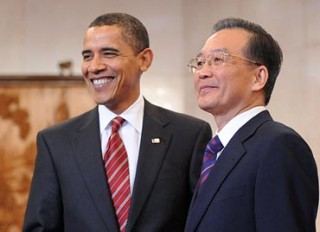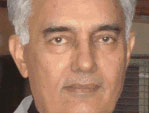A Silver Line for Pakistan
Brig Samson S Sharaf
The visit of the Chinese President Hu Jintao to USA will not live in memory for the declarations that were made in the  joint press conferences and the press releases. They are more significant in what has not been said. In the backdrop are diplomatic flurry, pre visit co ordinations and concessions from either side. In this calculus of mutual diplomatic conceding, inasmuch as China did not mention Kashmir, AF Pak and India, USA in quid pro quo refrained from mentioning Pakistan’s growing nuclear cooperation with China, WOT and the much trumpeted Long War.
joint press conferences and the press releases. They are more significant in what has not been said. In the backdrop are diplomatic flurry, pre visit co ordinations and concessions from either side. In this calculus of mutual diplomatic conceding, inasmuch as China did not mention Kashmir, AF Pak and India, USA in quid pro quo refrained from mentioning Pakistan’s growing nuclear cooperation with China, WOT and the much trumpeted Long War.
Though irritants, suspicions and differences were not highlighted publically, they nonetheless formed the perspective in which this diplomacy was framed. Cognisant of the upcoming elections in USA and the support that Barak Obama needs from the right, Philip J. Crowley the State Department Spokesman was quick to assert that ‘there’s no change in the US policy.’ On a question, that references to irritants and suspicions were dropped as a policy to appease India, he evaded the issue and responded, ‘I think it’s a manifestation of the nature of our discussions here… that we have ongoing with China. But, no, I wouldn’t read anything else into it.’
This sums of the exploratory and confidence building nature of this high profile visit to USA.
In light of the constraints faced by President Obama and the State Department in addressing issues that in fact destabilise South Asia, Afghanistan and the surrounding regions, rhetoric was low key. Following the Democrat traditions of resolving issues diplomatically, this establishment is handicapped by a somewhat lame duck President, Pentagon that calls all shots on strategic and security issues and the desire to co-opt India for its long term objectives in Central and South Asia.
In contrast, though the Chinese President too faces his elections, he appears to be fully backed in his diplomacy and can go back and claim that he has made significant economic and diplomatic success. He also spared US the diplomatic spar by not mentioning that China had already begun reducing its exports to USA, that USA was causing international financial destabilisation by printing out dollars and its human rights record in Guantanamo Bay and rendition centres. More so at the heels of aggressive diplomatic visit by Vice President Biden and Mullen’s mantra to do more, it was also for the first time that Pakistan was not in the head lines as a punching bag for US failures in Afghanistan. Though India feels happy at its diplomatic clout and staying on the right side of State Department diplomacy, no mention of Pakistan caused much dismay in its thinking circles.
Economically, in face of a 275 Billion Dollar trade deficit, conceding exports deals to a tune of around 45 Billion Dollars is not significant. In addition, China also agreed to give US contractors proximately to 88 Billion Dollars contracts and an order for 200 Boeing aircrafts worth 19 Billion Dollars creating jobs for a starved US work force. In return, China will get access to the lucrative US locomotive market and joint manufacturing facilities with General Electric (GE) that in a few years will help Chinese Locomotive industries to elbow out GE just as it has done with the German, French and Japanese locomotive manufacturers in the past.
But the irritants remain. China is the direct recipient of the US LONG ARM-LONG WAR Strategy. Both eastward expansion of NATO and the bases in Afghanistan affect it directly. China realises that US is unhappy about Chinese presence in Pakistan and Balochistan. It also knows that Baloch separatist movements that are particularly anti Chinese have sponsors with US blessings. Then there are issues of US arms sales to Taiwan, Dalai Lama, Kashmir, India and support to Pakistan. The fact that this visit avoided such real issues reflects multiple connotations.
First, The Chinese have displayed remarkable cognisance and insight of the constraints faced by the Democrat administration. They have provided the US administration with enough economic concessions to carry to their vote banks in the next presidential elections and return with the people’s verdict. Then the road to economic engagements will be more promising and may lead to a matrix whence economic compulsions will over shadow military concerns.
Secondly, the Chinese see the Democrats far better diplomatic partners than the Republicans who represent the right, are militarily adventurous and more aligned to the Pentagon. Hence the Chinese have decided to bet on them for peace in the region.
Thirdly, this also raises a question whether China has managed to avert an extra ordinary escalation in AF-PAK at the heels of the Biden’s visit and Petraeus’ Plan. If it has, then roads to a diplomatic and negotiated settlement of the afghan issue will be wide open.
Fourthly, it brings back North Korea to the negotiating table. This also impacts Chinese bilateralism with Japan and South Korea, crucial to Chinese economic progress.
In case the Chinese achieve these objectives, then the regions around Pakistan are likely to see a graduated de-escalation, return of diplomacy as an instrument to negotiate peace and improved Pakistan Afghan relations.
This would also open doors to India and Pakistan to resume peace diplomacy boost trust and confidence building measures across the entire spectrum of irritants, particularly along the Line of Control. Peace along the divided frontier of Kashmir will give a much needed respite to the people of the region, permit them to interact, carry out mutual trade and reduce force levels pending the resolution of the question under UN auspices.
The success will also provide Pakistan to concentrate more on its domestic issues, challenge the forces of intolerance and give breathing space to the armed forces to play a pro active role in national development in the post conflict, post earth quake and post flood scenario.
Readers may be surprised at my assertion, but it is a fact that the Pakistani system lacks the wherewithal to absorb and deliver on the significant aid flowing into Pakistan. It is time that as in the 50s and 60s, the armed forces play their role in national development as the most viable and constitutional instrument to absorb and deliver these projects rather than the shady NGO Mafias aligned with the corrupt officials and politicians of the governments.
Just like Algeria faces a people’s revolution, Pakistan is not far behind. If that happens, then the forces of intolerance will unleash themselves against the entire system. The government must realise that far too much time has been lost to political tantrums and it is time they deliver honestly. The only democratic options are to either perform or call for immediate elections. The slide and rot must be stopped and arrested.
Brigadier Samson Simon Sharaf is a retired infantry officer of Pakistan Army and honorary Colonel of the First Sindh Regiment. He has the distinct honour of serving in the Military Operations Branch GHQ during the most interesting and eventful years of Pakistan’s history. Did his Post Graduation from Quaid e Azam University with distinction. His specialization is International Political Economy with sharp focus on Nuclear Policy Making and Security.
He is a frequent speaker in national and international seminars and writes through the framework of established theoretical paradigms. His hundreds of articles though futuristic have invariably been vindicated. He has also been a High Altitude mountaineer, trekked the entire perimeter of Pakistan and explored the harsh and difficult NARA Desert in the severest summer heat. He is Rector of St. Mary’s College, the first Catholic Higher education Institution in Pakistan and CEO of both Ecotech Iternational Inc. USA and WaterTech Private Limited, Pakistan. He is a pioneer of relief water in disaster areas.
Brig Sharaf is a regular contributor to Opinion Maker.

After graduating from college, I joined Pakistan Army and was commissioned in a Tank Regiment. I am a veteran of the Indo-Pakistan war. After leaving the Army, I joined IT as a profession. I was hired by Kuwait Air Force And Air Defence as an Adviser to computerize its entire operation. Here I was the Chief Coordinator of the Project, Kuwait Automated Support System (KASS). It was a state-of-the-art leading-edge technology where we established over 500 online terminals network with dedicated voice and data communications. It had Satellite linkups to connect with other systems and track the inventory movement for KAF & AD. On this project, I was coordinating with the US Navy, IBM World, AT&T, and Martin Marietta for the development, deployment, and operation of the KASS. Writing has always been a passion for me, been writing for 25 years for various newspapers and periodicals. Now for the last four years, I have formed my virtual Think Tank, Opinion Maker. Here we have some renowned writers from Pakistan and abroad who contribute regularly that’s helping the world opinion in some way. I am a keen golfer may not be a good one but play on a daily basis. I am also fond of using the camera to picture nature and people.
ATTENTION READERS
We See The World From All Sides and Want YOU To Be Fully InformedIn fact, intentional disinformation is a disgraceful scourge in media today. So to assuage any possible errant incorrect information posted herein, we strongly encourage you to seek corroboration from other non-VT sources before forming an educated opinion.
About VT - Policies & Disclosures - Comment Policy



